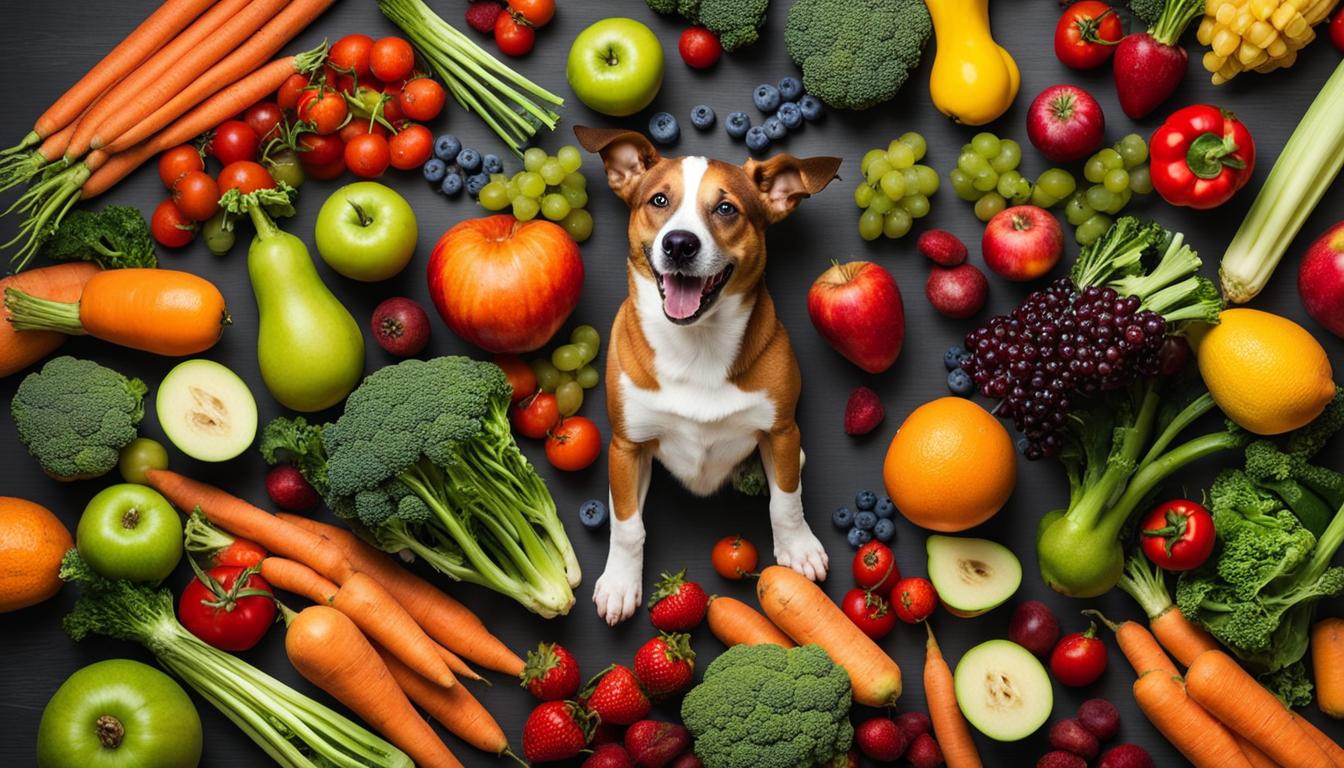In this article, we will explore the topic of fruits and vegetables for dogs. You may be wondering, do dogs need fruits and vegetables? What are the benefits of incorporating them into your dog’s diet? Are fruits and vegetables essential for dogs? Let’s find out!
Dogs are omnivores and can get nutrients from meat. Fruits and vegetables can also be beneficial in moderation. These natural foods contain vitamins, minerals, and antioxidants for good health.
It’s important to be cautious about the fruits and vegetables. You offer them to your furry friend. Some are safe and even beneficial, while others can be toxic to dogs. Apples, bananas, blueberries, cantaloupe, and mangoes are safe for dogs. But, you should avoid avocados, cherries, grapes, and onions.
No one knows why, but I REALLY love peas. It’s the only vegetable or even healthy thing I like- I spit out almost all other fruits and vegetables! And I always beg and cry for more even when they’re gone!! 🤷 #dog #dogs #sheltie #dogsoftwitter #food #peas #PleaseShare #treats pic.twitter.com/tFgOeczefB
— Mr. Lassie (@MrLassie) May 30, 2022
Always remove seeds, pits, or cores from fruits before giving to your dog. This is important because they can be a choking hazard or contain toxins. Before making significant changes to your dog’s diet, consult your vet. They ensure meeting their nutritional needs.
We will explore the advantages of adding fruits and vegetables to your dog’s diet. Additionally, we will share safe practices to follow. Let’s keep exploring fruits and vegetables for our furry friends.
The Benefits of Adding Fruits and Vegetables to Your Dog’s Diet
Dogs are carnivores, but adding fruits and vegetables is beneficial. Fruits and vegetables contain vitamins and minerals. These nutrients contribute to a dog’s health and well-being. They have important nutrients like vitamin C and potassium. These nutrients help support the immune function and heart health of dogs. Adding various fruits and vegetables to your dog’s meals gives them more nutrition.
Including fruits and vegetables in your dog’s diet is beneficial. It aids digestion and promotes healthy bowel movements. The fiber found in these foods aids in digestion and can prevent constipation. Also, dogs can get antioxidants from fruits and vegetables. Antioxidants fight free radicals and lower disease risk.
The Nutritional Value of Fruits and Vegetables for Dogs
When choosing fruits and vegetables for your dog, there are many safe options. These options can also provide several benefits for your dog. Some of the best fruits for dogs include apples, bananas, blueberries, and watermelon. These fruits are low in calories and high in nutrients, making them a healthy addition to your dog’s diet. Vegetables such as carrots, sweet potatoes, and green beans are also excellent choices. They provide essential vitamins and minerals, as well as fiber to support digestion.
When you begin adding fruits and vegetables to your dog’s food, start with small amounts. Then, increase the quantity over time. This will help your dog’s digestion and prevent stomach problems. Choosing fresh and organic options is crucial. It helps cut exposure to pesticides and harmful chemicals.
In conclusion, fruits and vegetables are not essential for a dog’s diet. But, they can provide many benefits when added in appropriate amounts. They provide essential nutrients, support digestion, and contribute to health. Adding various fruits and vegetables to your dog’s meals improves their diet. It also enhances their well-being.
Safe Practices for Feeding Fruits and Vegetables to Your Dog
Are fruits and vegetables safe for dogs? Adding fruits and vegetables to your dog’s diet can be healthy. But, it’s important to follow safe practices. Remember, give fruits and vegetables to your dog in moderation. They supplement their regular diet and should not replace nutrition.
Make sure to avoid toxic fruits and vegetables for your dog. Examples include avocados, grapes, and onions. You should keep these out of reach at all times because they can cause serious health issues. Before giving fruits to your dog, remove seeds, cores, and pits. These can cause choking or contain toxins.
It’s a good idea to talk to your vet before making any big changes to your dog’s diet. This includes adding fruits and vegetables. They can guide you on which fruits and vegetables are safe for your dog. They ensure that they meet your dog’s nutritional needs.
So, should dogs eat fruits and vegetables? Including them in their diet is healthy. Practice safe feeding habits and consult your vet. By doing this, you can make sure your pet enjoys the advantages of fruits and veggies. They will stay happy and healthy.
FAQ
Do dogs need fruits and vegetables in their diet?
Dogs are omnivores and can derive all necessary nutrients from meat. Fruits and vegetables are beneficial for dogs in moderation.
What are the benefits of adding fruits and vegetables to a dog’s diet?
Fruits and vegetables can provide vitamins, minerals, and antioxidants. These contribute to the health of dogs. They can support immune function, heart health, digestion, and healthy bowel movements.
Which fruits and vegetables are safe for dogs to eat?
Dogs can eat certain fruits like apples, bananas, blueberries, cantaloupe, and mangoes. Carrots and sweet potatoes are also good options. But dogs should avoid avocados, cherries, grapes, and onions as they can be toxic.
How should I introduce fruits and vegetables to my dog’s diet?
Start with small portions. Increase to prevent digestive upset. It is also recommended to choose fresh and organic options whenever possible.
Are there any safe practices I should follow when feeding fruits and vegetables to my dog?
Dog owners should give fruits and vegetables to their dogs in moderation. They supplement the dog’s regular diet. They should never replace the main source of nutrition. To keep dogs safe, avoid feeding them toxic fruits and vegetables. Prepare these foods by removing seeds, cores, and pits. Before making major changes to a dog’s diet, consult a vet.
